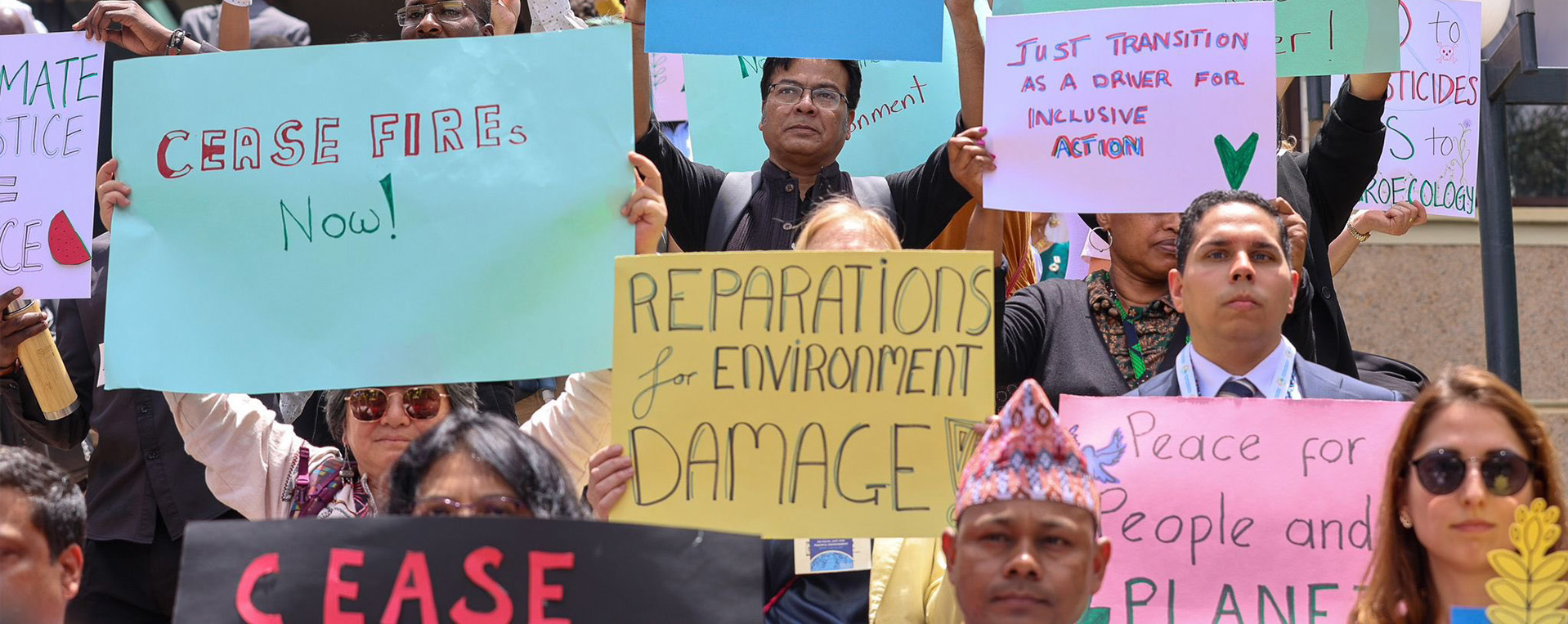At the Sixth Session of the UN Environmental Assembly (UNEA-6) in Nairobi, the devastating impacts of wars on people’s lives, livelihoods and the planet has been one of the cross-cutting themes in the discussions over multilateral actions to tackle the triple planetary crisis. UNEA-6 ended with the adoption of Ukraine’s new resolution UNEP/EA.6/L.15 on environmental assistance and recovery in areas affected by armed conflict.
The text urges States to address environmental monitoring and remediation in conflict-affected areas, and strengthens the role of the UN Environment Program (UNEP) in its work on conflicts. Despite the resolution’s text being watered down after weeks of intense negotiations, there are still ample opportunities for the UN to make progress with its effective implementation – for which the involvement of the civil society would be crucial.
More urgent than ever
With the wars in Syria, Iraq, Yemen and more recently, Ukraine and Gaza, the need to address the environmental dimensions of armed conflicts has become more urgent than ever. Adoption of this resolution represents a significant deliverable of UNEA-6. It is a logical continuation of two previous UNEA resolutions on the protection of the environment in areas affected by armed conflicts and on conflict-pollution, as it calls on States to adhere to the rules of international law in relation to the protection of the environment in areas affected by armed conflict, explores ways to improve international efforts around environmental assistance and recovery from the impacts of armed conflicts; and initiates the development of technical guidance on the collection and sharing of environmental data associated with armed conflicts.
PAX methodology
Proper documentation of environmental impacts of war is instrumental for faster clean-up and remediation, underscoring the necessity of a solid mechanism for data collection, analysis and dissemination. Since 2015, PAX has been pioneering a new methodology to monitor environmental impacts of wars through open-source data collection and satellite imagery that provides an in-depth analysis of the broad set of environmental dimensions of armed conflicts in the countries it works in. This method is now picked up by humanitarian groups, UN agencies and civil society groups and provides promising possibilities to be expanded on and mainstreamed into conflict-analysis and response. The adopted UNEA-6 resolution can become a vehicle for progress on supporting conflict-affected states and communities with environmental recovery while building on the vast expertise of civil society in this field.
Steps to come
While there are still no grounds for complacency about the international efforts to effectively tackle the environmental destruction of war (and to prevent it in the first place), this UNEA-6 resolution is clearly a step in the right direction.
The resolution’s effective implementation would be the next important step. The involvement of the civil society’s groups and experts in this process would be crucial to make it a success. At UNEA-6, PAX was actively advocating to strengthen international responses to conflicts’ contributions to the triple planetary crisis in civil society’s interventions and policy recommendations, through supporting the silent solidarity protest, and at side events. Six Major Groups and Stakeholders, four Regional Facilitators, along with over 30 non-governmental organizations issued a joint call to States to adopt the resolution on environmental assistance and recovery in areas affected by armed conflict. At the implementation stage, civil society experts can share best practices and lessons learned, and bring together affected communities, academia and humanitarian organizations to move forward on strengthening environmental assistance to conflict-affected States and on bolstering UNEP’s work in the wake of wars.




